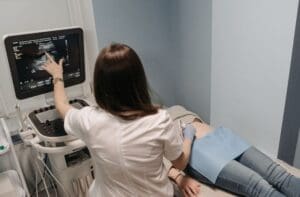Salina, KS- Central Kansas Mental Health Center (CKMHC) accomplished a pivotal milestone in the process of transitioning to a Certified Community Behavioral Health Clinic (CCBHC) by earning provisional certification from the Kansas Department for Aging and Disability Services (KDADS) in March.
After a year of preparation, CKMHC submitted their application for certification on February 15. This process included a comprehensive needs assessment addressing cultural, linguistic, treatment, and staffing needs, while also assessing available resources in the service area including transportation, income, culture, and other barriers.
The certification application requires that CKMHC demonstrate the ability to meet the stringent national standards for CCBHCs. This includes the ability to deliver integrated care to each patient and the development of internal policies and procedures that ensure that patents will receive the right care at the right time.
KDADS is overseeing the certification process in Kansas, following national standards set by the Substance Abuse and Mental Health Services Administration (SAMHSA). Representatives from KDADS performed a site visit of the CKMHC campus on February 7, where they were able to describe their vision for what CCBHCs could be, and assess CKMHCs readiness to achieve those goals.
CKMHC received notice on March 2 that KDADS approved their application, earning provisional certification through December of 2023.
“This is transformational change for the Community Mental Health Centers (CMHCs) in Kansas and the people we serve,” stated Jennifer Kaufman, CCBHC Project Director. “The CCBHC model is brand new to Kansas. Because of this, KDADS is issuing provisional licenses that provide 18 months to work closely with the CMHCs in order to evaluate and improve the system moving forward.”
This process will allow states flexibility in determining how to implement the criteria in a manner best addressing the needs of the population served. The criteria is designed to encourage states and CCBHCs to further develop their abilities to offer behavioral health services that comport with current best practices. Currently 40 states are implementing the CCBHC model.
With this transition, CKMHCs organizational goals include reducing barriers to care and delayed care, addressing the current suicide and overdose crisis, providing relief for overburdened jails and ERs, and expanding care and outreach to veterans.
Having been involved in the process from the beginning, Kaufman is ready for the positive impact certification will have. “The CCBHC model of care allows us to remove barriers that disrupt our ability to treat the whole person,” she said. “Will we still treat mental health? Absolutely, but we will also be better positioned to address factors that exacerbate mental health challenges, like physical health, substance use, and socioeconomic status. We can strengthen our community partnerships and referral processes so support systems are readily available to meet the needs of the patient.”
The CCBHC model has also proven to help attract and retain professional healthcare workers, supporting increased revenues and competitive wages. “This will really give our staff and organization the capacity to be the change makers for mental health in our communities,” Kaufman added.
“Becoming a CCBHC has meant adopting new national guidelines that standardize operations of mental health, substance use, community based, and physical health care services,” said Glenna Phillips, Executive Director of CKMHC. “My overall goal is for CKMHC to be recognized as a great place to get care and a great place to work. We are an organization providing rapid access to specialty behavioral health services that include high value, comprehensive, whole person care that supports resiliency and recovery and results in excellent outcomes, and high client satisfaction.”
In 2021 CKMHC received a two-year, $4 million grant to initiate the shift to the CCBHC model. This funding supports organizational changes and staffing in order to achieve and maintain certification.
The State of Kansas codified the CCBHC model with the passing of HB 2208 in 2021, laying the groundwork for “the most significant transformation of the Kansas community mental health system in decades,” according to Gov. Laura Kelly. Currently there are six Community Mental Health Centers, including CKMHC, going through the certification process. KDADS estimates that all 26 of Kansas’ CMHCs will be certified CCBHCs by the end of 2024.
The mission of CKMHC is to make life better in our communities by providing excellent mental health services, education, and integrated care, which exceeds patients’ expectations. CKMHC is a nonprofit provider and delivers services based on medical necessity, regardless of age, race, color, national origin, disability or ability to pay. In addition to the main campus in Salina, satellite offices are located in Abilene, Ellsworth, Lincoln, and Minneapolis.
For more information on Central Kansas Mental Health Center or any of the organization’s services call 785-823-6322 or visit our website at www.ckmhc.org.












